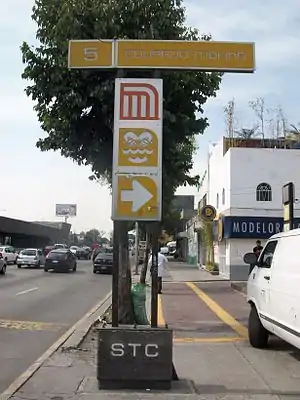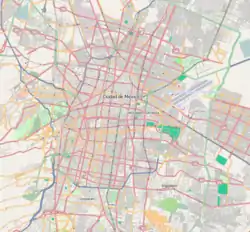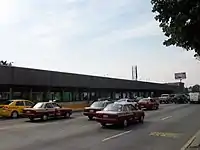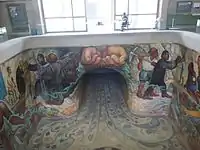Eduardo Molina metro station
Eduardo Molina (![]() Spanish pronunciation ) is a Mexico City Metro station in the limits of Gustavo A. Madero and Venustiano Carranza, in Mexico City. It is an at-grade station with one island platform, served by Line 5 (the Yellow line), between Consulado and Aragón stations. Eduardo Molina station serves the colonias 20 de Noviembre and Malinche. The station is named after Eduardo Molina Arévalo, an engineer who helped to solve the problem of water scarcity in the Valley of Mexico in the mid-20th century, and its pictogram represents two hands holding water, as featured on the mural El agua, origen de la vida (lit. transl. Water, Origin of Life), painted by Mexican muralist Diego Rivera in the Cárcamo de Dolores, in Chapultepec, Mexico City. Eduardo Molina station was opened on 19 December 1981, on the first day of the Consulado–Pantitlán service.
Spanish pronunciation ) is a Mexico City Metro station in the limits of Gustavo A. Madero and Venustiano Carranza, in Mexico City. It is an at-grade station with one island platform, served by Line 5 (the Yellow line), between Consulado and Aragón stations. Eduardo Molina station serves the colonias 20 de Noviembre and Malinche. The station is named after Eduardo Molina Arévalo, an engineer who helped to solve the problem of water scarcity in the Valley of Mexico in the mid-20th century, and its pictogram represents two hands holding water, as featured on the mural El agua, origen de la vida (lit. transl. Water, Origin of Life), painted by Mexican muralist Diego Rivera in the Cárcamo de Dolores, in Chapultepec, Mexico City. Eduardo Molina station was opened on 19 December 1981, on the first day of the Consulado–Pantitlán service.
Eduardo Molina | ||||||||||||||||||||||||||||||||||||||||||||||||||||||||||||||||||||||||||||||||||||||||||||||||||||||||||
|---|---|---|---|---|---|---|---|---|---|---|---|---|---|---|---|---|---|---|---|---|---|---|---|---|---|---|---|---|---|---|---|---|---|---|---|---|---|---|---|---|---|---|---|---|---|---|---|---|---|---|---|---|---|---|---|---|---|---|---|---|---|---|---|---|---|---|---|---|---|---|---|---|---|---|---|---|---|---|---|---|---|---|---|---|---|---|---|---|---|---|---|---|---|---|---|---|---|---|---|---|---|---|---|---|---|---|
| STC rapid transit | ||||||||||||||||||||||||||||||||||||||||||||||||||||||||||||||||||||||||||||||||||||||||||||||||||||||||||
 Station sign, 2012 | ||||||||||||||||||||||||||||||||||||||||||||||||||||||||||||||||||||||||||||||||||||||||||||||||||||||||||
| Location | Río Consulado Avenue, Gustavo A. Madero and Venustiano Carranza Mexico City Mexico | |||||||||||||||||||||||||||||||||||||||||||||||||||||||||||||||||||||||||||||||||||||||||||||||||||||||||
| Coordinates | 19°27′05″N 99°06′20″W | |||||||||||||||||||||||||||||||||||||||||||||||||||||||||||||||||||||||||||||||||||||||||||||||||||||||||
| Operated by | Sistema Transporte Colectivo Metro | |||||||||||||||||||||||||||||||||||||||||||||||||||||||||||||||||||||||||||||||||||||||||||||||||||||||||
| Line(s) | Line 5 | |||||||||||||||||||||||||||||||||||||||||||||||||||||||||||||||||||||||||||||||||||||||||||||||||||||||||
| Platforms | 1 island platform | |||||||||||||||||||||||||||||||||||||||||||||||||||||||||||||||||||||||||||||||||||||||||||||||||||||||||
| Tracks | 2 | |||||||||||||||||||||||||||||||||||||||||||||||||||||||||||||||||||||||||||||||||||||||||||||||||||||||||
| Connections | ||||||||||||||||||||||||||||||||||||||||||||||||||||||||||||||||||||||||||||||||||||||||||||||||||||||||||
| Construction | ||||||||||||||||||||||||||||||||||||||||||||||||||||||||||||||||||||||||||||||||||||||||||||||||||||||||||
| Structure type | At grade | |||||||||||||||||||||||||||||||||||||||||||||||||||||||||||||||||||||||||||||||||||||||||||||||||||||||||
| History | ||||||||||||||||||||||||||||||||||||||||||||||||||||||||||||||||||||||||||||||||||||||||||||||||||||||||||
| Opened | 19 December 1981 | |||||||||||||||||||||||||||||||||||||||||||||||||||||||||||||||||||||||||||||||||||||||||||||||||||||||||
| Passengers | ||||||||||||||||||||||||||||||||||||||||||||||||||||||||||||||||||||||||||||||||||||||||||||||||||||||||||
| 2019 | 2,486,165[1] | |||||||||||||||||||||||||||||||||||||||||||||||||||||||||||||||||||||||||||||||||||||||||||||||||||||||||
| Rank | 176/195[1] | |||||||||||||||||||||||||||||||||||||||||||||||||||||||||||||||||||||||||||||||||||||||||||||||||||||||||
| Services | ||||||||||||||||||||||||||||||||||||||||||||||||||||||||||||||||||||||||||||||||||||||||||||||||||||||||||
| ||||||||||||||||||||||||||||||||||||||||||||||||||||||||||||||||||||||||||||||||||||||||||||||||||||||||||
| ||||||||||||||||||||||||||||||||||||||||||||||||||||||||||||||||||||||||||||||||||||||||||||||||||||||||||
| Location | ||||||||||||||||||||||||||||||||||||||||||||||||||||||||||||||||||||||||||||||||||||||||||||||||||||||||||
 Eduardo Molina Location within Mexico City | ||||||||||||||||||||||||||||||||||||||||||||||||||||||||||||||||||||||||||||||||||||||||||||||||||||||||||
Location

Eduardo Molina is a metro station located on Río Consulado Avenue, in northeastern Mexico City.[2] The station serves the colonias 20 de Noviembre, in Venustiano Carranza,[3] and Malinche, in Gustavo A. Madero.[4] Within the system, the station lies between Consulado and Aragón stations.[2]
The Río Consulado Metrobús station (Line 5) services the area.[2]
History and construction

Line 5 of the Mexico City Metro was built by Grupo ICA,[5] and its first section was opened on 19 December 1981, operating from Pantitlán to Consulado stations.[6] Eduardo Molina is at grade;[7] the station is named after Eduardo Molina Arévalo,[2] a Mexican engineer who helped to solve the problem of water scarcity in the Valley of Mexico in the mid-20th century through the Lerma River system,[8][9] and the station's pictogram features two hands holding water, a reference to a fragment of the mural El agua, origen de la vida (lit. transl. Water, Origin of Life),[2] painted by Diego Rivera inside the main building of the Cárcamo de Dolores, a hydraulic sump structure in Chapultepec, Mexico City.[10][11]
Incidents
After the 2015 Oceanía station train crash, Eduardo Molina station was temporarily closed for repairs.[12] From 23 April to 15 June 2020, the station was temporarily closed due to the COVID-19 pandemic in Mexico.[13][14]
Ridership
In 2019, Eduardo Molina station had an overall ridership of 2,486,165 passengers,[1] which was a decrease of 75,730 passengers compared to 2018.[15] In the same year, Eduardo Molina was the 176th busiest station of the system's 195 stations, and it was the line's 9th busiest.[1]
| Annual passenger ridership | |||||
|---|---|---|---|---|---|
| Year | Ridership | Average daily | Rank | % change | Ref. |
| 2019 | 2,486,165 | 6,811 | 176/195 | −2.96% | [1] |
| 2018 | 2,561,895 | 7,018 | 175/195 | +5.08% | [15] |
| 2017 | 2,437,928 | 6,979 | 173/195 | −4.72% | [16] |
| 2016 | 2,558,663 | 7,010 | 174/195 | −4.04% | [17] |
| 2015 | 2,666,483 | 7,305 | 160/195 | −1.41% | [18] |
| 2014 | 2,704,567 | 7,409 | 159/195 | −7.23% | [19] |
| 2013 | 2,915,243 | 7,986 | 167/195 | +4.93% | [20] |
| 2012 | 2,778,187 | 7,590 | 152/195 | −11.22% | [21] |
| 2011 | 3,129,424 | 8,573 | 146/175 | +36.79% | [22] |
| 2010 | 2,287,814 | 6,267 | 155/175 | – | [23] |
References
- "Afluencia de estación por línea 2019" [Station traffic per line 2019] (in Spanish). Sistema Transporte Colectivo Metro. 2020. Archived from the original on 8 April 2020. Retrieved 3 May 2020.
- "Eduardo Molina" (in Spanish). Sistema de Transporte Colectivo Metro. Archived from the original on 5 July 2020. Retrieved 9 July 2020.
- "Colonia 20 de Noviembre, Código Postal 15300, Venustiano Carranza, Distrito Federal" [20 de Noviembre, postal code 15300, Venustiano Carranza, Mexico City] (in Spanish). Heraldo. Archived from the original on 15 July 2020. Retrieved 15 July 2020.
- "Colonia La Malinche, Código Postal 077899, Gustavo A. Madero, Distrito Federal" (in Spanish). Heraldo. Archived from the original on 15 July 2020. Retrieved 15 July 2020.
- "Línea 5, Ciudad de México" [Line 5, Mexico City] (in Spanish). iNGENET Infraestructura. 20 July 2009. Archived from the original on 2 September 2014. Retrieved 15 April 2020.
- "Baia, Baia, Tacubaya... Las estaciones del metro MÁS y MENOS utilizadas en CDMX" [Well, well, well... The MOST and LEAST used stations in Mexico City] (in Spanish). Nacion 321. 4 September 2019. Archived from the original on 15 April 2020. Retrieved 14 April 2020.
- "Eduardo Molina Metro Station (Mexico City, 1981)". Structurae.net. Archived from the original on 24 July 2020. Retrieved 22 July 2020.
- Mejía, Ximena (30 May 2015). "Cárcamo de Lerma, un culto al agua en el DF" [Sump of Lerma, a water cult in the Federal District]. Excélsior (in Spanish). Archived from the original on 22 July 2020. Retrieved 22 July 2020.
- López Munguía, Agustín (2006). "El metro, los alimentos y la biotecnología" [Metro: food and biotechnology] (PDF) (in Spanish). Dirección General de Divulgación de la Ciencia. National Autonomous University of Mexico. p. 10. Archived (PDF) from the original on 20 January 2012. Retrieved 9 July 2020.
- "Cárcamo de Dolores, fusión de arte y urbanismo" [Sump of Dolores, fusion of art and urbanism] (in Spanish). Comisión Nacional del Agua. Government of Mexico. 8 November 2017. Archived from the original on 22 July 2020. Retrieved 22 July 2020.
- "Mexico City with Kids: Museo del Carcamo de Dolores". Kiddiemundo. Archived from the original on 22 July 2020. Retrieved 22 July 2020.
- Alarcón, Rodrigo (5 May 2015). "RTP brindará traslado gratuito de Pantitlán a Eduardo Molina" [Red de Transporte de Pasajeros will provide free service from Pantitlán to Eduardo Molina]. Excélsior. Archived from the original on 30 October 2017. Retrieved 23 August 2020.
- "Cierre temporal de estaciones" [Temporal closure of stations] (PDF) (in Spanish). Sistema Transporte Colectivo Metro. Archived (PDF) from the original on 4 July 2020. Retrieved 25 April 2020.
- Hernández, Eduardo (13 June 2020). "Coronavirus. Este es el plan para reabrir estaciones del Metro, Metrobús y Tren ligero" [Coronavirus. This is the plan to reopen Metro, Metrobús and Light Rail stations]. El Universal (in Spanish). Archived from the original on 4 July 2020. Retrieved 15 June 2020.
- "Afluencia de estación por línea 2018" [Station traffic per line 2018] (in Spanish). Sistema Transporte Colectivo Metro. 2019. Archived from the original on 6 June 2019. Retrieved 7 April 2020.
- "Afluencia de estación por línea 2017" [Station traffic per line 2017] (in Spanish). Sistema Transporte Colectivo Metro. 2019. Archived from the original on 3 May 2020. Retrieved 3 May 2020.
- "Afluencia de estación por línea 2016" [Station traffic per line 2016] (in Spanish). Sistema Transporte Colectivo Metro. 2017. Archived from the original on 3 May 2020. Retrieved 3 May 2020.
- "Afluencia de estación por línea 2015" [Station traffic per line 2015] (in Spanish). Sistema Transporte Colectivo Metro. 2016. Archived from the original on 3 May 2020. Retrieved 6 May 2020.
- "Afluencia de estación por línea 2014" [Station traffic per line 2014] (in Spanish). Sistema Transporte Colectivo Metro. 2015. Archived from the original on 3 May 2020. Retrieved 6 May 2020.
- "Afluencia de estación por línea 2013" [Station traffic per line 2013] (in Spanish). Sistema Transporte Colectivo Metro. 2014. Archived from the original on 3 May 2020. Retrieved 6 May 2020.
- "Afluencia de estación por línea 2012" [Station traffic per line 2012] (in Spanish). Sistema Transporte Colectivo Metro. 2013. Archived from the original on 3 May 2020. Retrieved 6 May 2020.
- "Afluencia de estación por línea 2011" [Station traffic per line 2011] (in Spanish). Sistema Transporte Colectivo Metro. 2012. Archived from the original on 6 May 2020. Retrieved 6 May 2020.
- "Afluencia de estación por línea 2010" [Station traffic per line 2010] (in Spanish). Sistema Transporte Colectivo Metro. 2011. Archived from the original on 6 May 2020. Retrieved 6 May 2020.
External links
 Media related to Eduardo Molina (station) at Wikimedia Commons
Media related to Eduardo Molina (station) at Wikimedia Commons- Monzón, Jorge Arturo. "Photos 1-12 of 12: Eduardo Molina". world.nycsubway.org. Retrieved 28 August 2011.